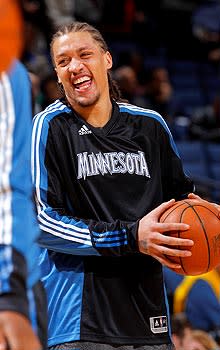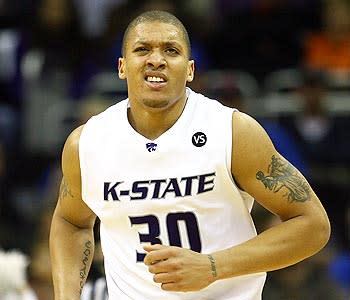Beasley traveled common road to NBA
If you were going to write a blueprint for how the agent selection/college recruiting process works (and, yes, that’s the proper order of events) during the one-and-done era of basketball, the Michael Beasley(notes)-vs.-Joel Bell countersuit would be a fine start.
We’ll leave the court to decide actual guilt in the civil suit filed by the Minnesota Timberwolves forward against his former NBA agent, which was first reported by The Washington Post on Wednesday.
The details, however, ring as par for the course in basketball.
Beasley alleges he was befriended at age 13 by a local AAU basketball powerbroker, Curtis Malone, who plotted with Bell to have Bell become Beasley’s agent when he eventually made the NBA. Malone is named in a third-party complaint.
Beasley lays out a litany of payouts and favors from Malone and Bell that may violate state and federal agent laws, as well as NCAA statutes. It may turn into a serious legal case, as well as an NCAA one for Kansas State, where Beasley played for one season.
This is the system though; this is how it works. And while it’s a fascinating window into the underbelly of basketball, it’s also a window that should be viewed from both sides.
It’s too easy to simply blame the supposedly slimy AAU coach or shady agent. They may not be fully pure here. They also may not be completely guilty. Malone denied the allegations to The Post through his attorneys. Bell didn’t return a phone call.
At age 13, Beasley was a prodigious talent in the Washington area. He was 6-foot and could handle the ball. He played on a local traveling team with Kevin Durant(notes).
He was also a troubled kid raised by a poor, single mother, according to the lawsuit. Beasley was assessed as having “special education needs” and had poor grades and a history of acting out. Enter Malone, who has coached and mentored dozens of great area players through the years, including NBA players Jeff Green(notes), Keith Bogans(notes) and DerMarr Johnson(notes). He's had scores of his players reach the college ranks.
Malone offered Beasley a spot with his D.C. Assault AAU program, waiving all fees and, the suit alleges, offering to pick up any travel costs for out-of-town tournaments for his mother.
[Related: Harrison Barnes glad he returned to UNC]
Beasley and Malone became so close that at age 14, Beasley moved into Malone’s home, which he shares with his wife and four children, including stepson Nolan Smith(notes), who just finished his basketball career at Duke.
Beasley’s mother acknowledges in the suit that Malone assumed “the status of a father figure with Beasley and a brother to her.” During this time she met Bell, who initially represented her on a suspended license legal case and began plying her with money, the suit alleges.
Beasley was a handful to mentor. He attended six high schools in five states and had academic, maturity and behavior issues. He eventually made it through, however, and signed with Kansas State. One of the Wildcats assistant coaches then was Dalonte Hill, who, like Beasley, had once played for Malone and also counted him as a father figure.
The choice of Kansas State was perfect for Beasley. The small-town environment of Manhattan, Kan., kept many temptations away. Beasley's mother and her other children also moved there. Her moving costs and rent were paid for, the suit reads, by an unnamed financial planner – and later Bell.
Beasley thrived under the coaching of Frank Martin during the 2007-08 season, where, at least offensively, he was given great freedom – his 577 shots attempted were the most in the Big 12 that season.
He wound up averaging 26.2 points and 12.4 rebounds, and was seen by the NBA as a player who had turned the corner. After his freshman season, he was selected second overall in the NBA draft. Bell became his agent.
Beasley's career has been up and down since then. There was an incident during the NBA's rookie seminar that led to a $50,000 fine. After his rookie season, he checked into a Texas rehab facility. The Heat traded him to Minnesota in the summer of 2010 to clear cap space for the signing of LeBron James(notes) and Chris Bosh(notes).
Beasley averaged 19.2 points last season; no one doubts his ability. He wound up firing Bell just before signing a deal with adidas. Bell sued him in January for lost agent fees, a move Bell may live to regret if the allegations in the inevitable countersuit prove true.
All in all it’s a wild, yet common tale.
Agents routinely donate money to AAU programs, which are often set up as non-profits, in order to get an early foothold and future talent. College coaches often use professional sports agents to assist in the recruiting process.
[Related: NBA rookies could get new pay scale in labor agreement]
What’s often lost, however, is the role of guys such as Malone and, to a lesser extent, Bell. Michael Beasley needed someone to guide him through the process of young playground star to NBA multimillionaire.
Like it or not, these were the guys available.
For Beasley only one good thing (the NBA) and a million bad ones could happen. And while college fans will bemoan the allegation that Beasley attending K-State was just a fixed recruitment, when it came to building Beasley’s career, it was also the correct one. Beasley had trouble everywhere he’d been. Kansas State was where he became an All-American, eased NBA fears and landed that big contract.
The suit alleges that Malone and Bell “intended, ultimately, improperly to induce Beasley into executing a player agent agreement without competition from other agents.”
Perhaps that proves to be true, but if so, there was a lot of effort involved. Malone raised him for nearly five years, after all, babysitting the prospect through endless pratfalls, mistakes and potential career-ending disasters. Beasley walked the thinnest of lines to the NBA. This would’ve been no easy “inducement.”
If Malone profited off his relationship with Beasley, as the suit claims, then it’s fair to say Beasley also profited off his relationship with Malone.
If Malone was a guy who trained young boxers or tennis players or singers or actors, no one would question him getting a kickback from helping an at-risk kid to riches and fame. And Bell would be just another birddog looking for the next big star.
Because it involves basketball – or more notably college basketball recruiting – Malone and Bell are vilified.
No, this stuff isn’t pretty. No, there isn’t anyone here that’s perfectly innocent. The NCAA rulebook shouldn't get to define ethics, however.
It’s a messy system and everyone involved is a product of it. It isn’t set up with the interest of top prospects. It’s designed to protect the so-called purity of college basketball, because pretending this isn't happening is great for TV ratings.
The NBA wants an age minimum, so their future stars get marketed at the college level. As such, it forces kids with limited academic interests into universities and the NCAA’s restrictive rulebook. The control-obsessed NCAA, meanwhile, is adamantly opposed to its young athletes having professional representation. The result is to force all of it underground, even if everyone involved in college athletics knows it's going on.
What’s left are stories like this one – a teen prospect on the edge, a local father figure with the know-how to guide him through the system and the eager agent willing to fund the entire operation against future fees.
What else does anyone expect to happen?
Other popular stories on Yahoo! Sports:
• Washington cancels alumni hoops scrimmage to avoid NCAA violation
• Mike Shanahan stumbling after wrong decisions at QB for Redskins
• Andy Dalton meets Bengals' hopes after Carson Palmer quit


